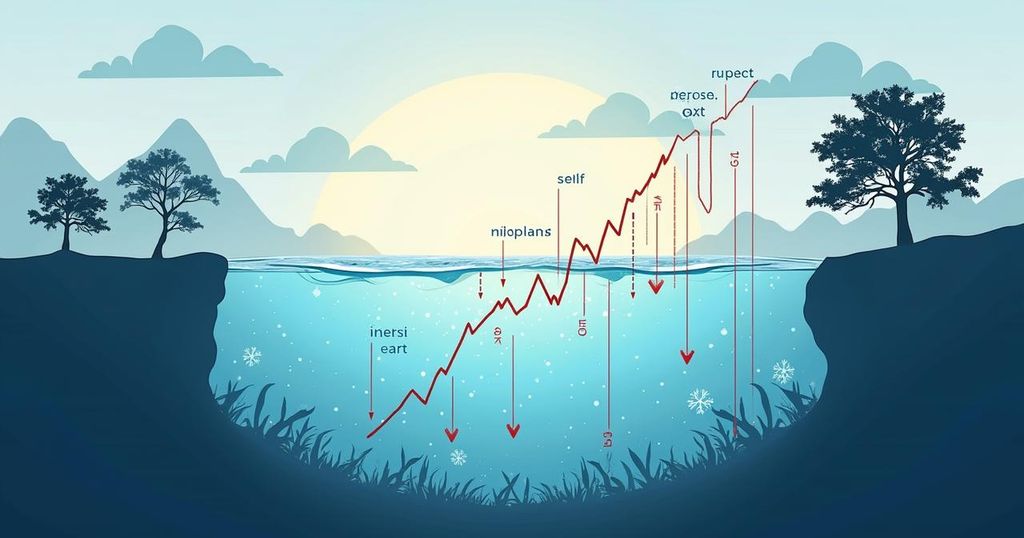UN Warns of Erratic Water Cycle Due to Climate Change

The United Nations warns that climate change is rendering the world’s water cycle increasingly erratic, leading to more intense floods and droughts. Recent reports indicate severe decreases in river flow and record glacier melt. The situation poses significant risks to human lives, particularly in Africa, while access to fresh water is set to decline for billions by 2050.
The United Nations has issued a stark warning regarding the increasing unpredictability of the planet’s water cycle, highlighting the distress signals presented by the occurrence of severe floods and droughts. According to a report from the UN’s World Meteorological Organization (WMO), recent climate change trends are causing rivers to experience their lowest levels of water flow in over 30 years and glaciers to undergo significant ice loss—the most in five decades. WMO Secretary-General Celeste Saulo remarked that water serves as a crucial indicator of climate change. She stated, “Water is the canary in the coalmine of climate change,” noting that extreme weather patterns have devastating implications for lives, ecosystems, and economies. The unprecedented warming of the Earth’s atmosphere has further exacerbated the irregularities observed in the water cycle. The prior year marked the hottest on record, with high temperatures leading to prolonged droughts and numerous flooding events across the globe. Both naturally occurring climate phenomena, such as La Niña and El Niño, and human-induced climate change contribute to these extreme weather patterns. Saulo elaborated that a warmer atmosphere is capable of retaining more moisture, which contributes to heavier rainfall, while accelerated evaporation exacerbates drought conditions. The impact of these water cycle disturbances is profound, especially in Africa, which has faced significant human casualties due to various climatic events. A notable instance was the collapse of two dams in Libya during a severe flood in September 2023, resulting in over 11,000 fatalities and affecting 22 percent of the population. Regions like the Greater Horn of Africa, the Democratic Republic of Congo, Rwanda, Mozambique, and Malawi have also been adversely affected by flooding. Currently, approximately 3.6 billion individuals lack reliable access to fresh water at least once a month, a figure projected to exceed five billion by 2050. Data indicates that more than half of river catchments have experienced below-normal dryness for the past three years. Simultaneously, reservoir inflows have been insufficient, contributing to a worrying trend of glacial melting—recorded at over 600 billion tonnes lost, marking the most significant loss in the last 50 years. Saulo stressed the urgent need for comprehensive action: “Melting ice and glaciers threaten long-term water security for many millions of people. And yet we are not taking the necessary urgent action.” Furthermore, she emphasized the importance of monitoring fresh water resources to facilitate early warning systems aimed at mitigating damage to both humans and wildlife. Stefan Uhlenbrook, Director of the WMO’s hydrology, water and cryosphere department, underscored the need for increased investment in infrastructure to protect water resources and safeguard communities against environmental hazards. He also pointed out the necessity to conserve water, particularly for agricultural purposes, which account for 70 percent of global fresh water consumption. Uhlenbrook forewarned that reverting to a more stable natural water cycle is a challenging prospect, declaring, “The only thing we can do is to stabilize the climate, which is a generational challenge.”
The climate crisis has led to unprecedented changes in the world’s water cycle, resulting in both extreme droughts and floods that disrupt various ecosystems and human societies. The UN’s focus on this topic emphasizes the urgent global implications of water scarcity and excess, demanding immediate and coordinated responses from nations and policymakers alike. This issue affects billions and poses challenges not only to water security but also to economic stability and public health.
The findings presented by the UN highlight a concerning trajectory for the planet’s water resources, underscoring an urgent need for global action to address climate change. The erratic nature of the water cycle poses serious risks to human life and ecosystems, necessitating improved monitoring and management of water resources, as well as substantial investments in infrastructure to combat climate-related hazards. Without decisive action, the situation is poised to worsen, potentially affecting billions by mid-century.
Original Source: www.france24.com






